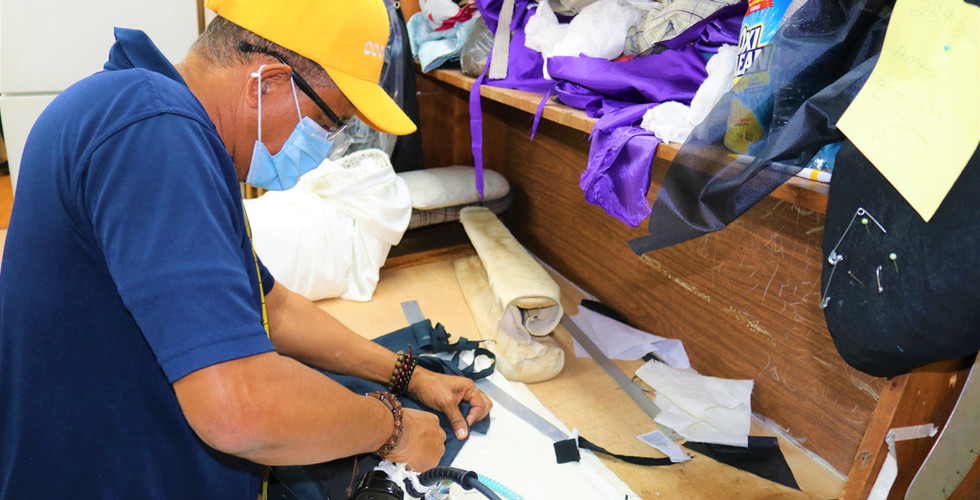JOIN THE COLLECTIVE
- Yulia Strokova

- Sep 11, 2022
- 5 min read
Updated: Sep 13, 2022
Collaboration is nothing new. The nonprofit sector is full of examples of partnerships and cooperation that drive social change.
But unlike most collaborations, collective impact involves a centralized infrastructure, a dedicated staff, and a structured process that leads to a common agenda, shared measurement, continuous communication, and mutually reinforcing activities among all participants.
We sat down with several community leaders whose mission is to look to society’s intersections to inspire collective impact.
By Kacie Brown

Mileyka Burgos first discovered Allapattah in 1998. She’d just moved to Miami, and at first, she was homesick. “I asked some friends to bring me to a place where I could get my hair done and eat some good food. They brought me to Allapattah, and I felt right at home,” she says.
Nestled in the heart of Miami, Allapattah’s streets are lined with family-owned businesses. When many of them opened decades ago, their presence wouldn’t have been so economically significant. But in a neighborhood on the front lines of climate gentrification, fighting to be heard by companies and officials who seem to value commerce over community, these businesses’ storefronts represent much more than their Dominican food or tailoring services.
Allapattah was a landing area for people arriving in the United States from Cuba, the Dominican Republic, Haiti and other countries. Over time, though, Mileyka saw some of the businesses that made her feel at home lose theirs. For a while, she just waited. But she says she realized she couldn’t stand by and watch big business outprice her community’s culture and sweat equity.
Mileyka founded The Allapattah Collaborative, CDC to support the neighborhood through advocacy and equitable development. The Collaborative partners with dozens of organizations to host training workshops on topics ranging from small business resiliency to procurement opportunities. They even provide individualized assistance to local businesses and startups.
It’s not all business, though. The Allapattah Collaborative forges deep community connections by creating gathering spaces like the Storytelling Garden at Allapattah Library and keeping residents engaged in cultural events.
Sastreria Aquino in Allapattah, Miami, FL
Mileyka says everyday people can help support Allapattah, too; just by visiting the area’s many businesses and advocating for protective policies through civic engagement.
After years of working with Allapattah residents, Mileyka says she’s noticed that one of their biggest needs is a regained sense of ownership. They’ve spent decades dealing with the consequences of decisions made without their input.
“The moment that we allow the community to show that this is their land, this is their space and they do have a viable voice – that is going to effect change, and they may feel more inclined to really take true ownership of the community,” she says.
The Hebrew phrase “tikkun olam” means “to repair or heal the world,” and Bevy Daniel, a fellow at Repair the World Miami says it’s one of Judaism’s guiding principles.
“It’s this idea that, if you're Jewish, no matter who you are or how you practice, there’s this imperative to make the world better,” Bevy says. “I always think of the name Repair the World not like things are broken or like we're trying to single-handedly repair something, but rather that we’re bringing people together and bringing together a strength and power and beauty that already exists in communities.”
Repair the World Miami is a chapter of Repair the World’s nationwide network of Jewish young adults committed to furthering social justice. The group mobilizes volunteers of all backgrounds and connects them with opportunities to serve across the Miami area.
Repair the World works in close collaboration with the community organizations they serve. Their two-year fellowships match young social justice leaders with one or two community organizations and give the fellows firsthand insight into the organization’s needs.
Whether they’re writing letters to incarcerated women with LEAP or gardening at Green Haven Project, senior program associate David Weitzman says Repair the World Miami is also helping foster open-mindedness and understanding in its volunteers.
“A big component of our work is just really being willing to be quiet and listen to our partners who are experts in their causes and lived experiences,” he says.
City Director Jacki Altman says much of their work to educate volunteers is in contextualizing their actions.
"Engaging in community work means understanding what we personally -- and as a community -- bring into a space. We have to have awareness of our intersecting identities and biases to be effective allies," she says.
Part of Repair the World Miami’s 10 Days of Connection initiative was an educational social media campaign that explored mental health and economic and environmental justice. To provide thoughtful, accurate and relevant information leading up to in-person conversations, they partnered with several organizations, including Dream in Green and another group with religious roots: MCCJ.

Founded in response to the nationwide rise in hate groups in the 1920s, especially those who targeted Catholic and Jewish people, the National Conference of Christians and Jews hoped to unite to slow the spread of hate.
Nearly 90 years later, MCCJ, the conference’s Miami branch, is still fostering constructive, cathartic conversations. But they’ve expanded and adapted to address tensions of the times. They still hold clergy dialogues – the longest standing in the country – but now, Buddhists, imams and others speak alongside rabbis and priests. And they’re clearly drawing upon this background in unifying marginalized groups through dialogue with their new focus: social justice.
“We have an opportunity to listen to the needs of the community and try to create a space that is sacred enough for that community to feel comfortable and share what needs to happen to address their needs,” Associate Executive Director Nikki Watkins says.
They create these spaces for groups ranging from public school students to business leaders.
Their JEDI training, for example, goes beyond DEI training to incorporate justice-centered education. Moni Barrios, MCCJ’s community outreach and operations director, recently attended the workshop, and says it clearly left an impression on many of the young adults in the room.
“If you haven’t taken it, find a way,” she says.
They’re also exposing kids to topics like justice and equity from a young age. This year, participants in MetroTown, MCCJ’s camp for high school students, attended the Holocaust Memorial, experienced a poverty simulation, engaged in discussions on the ways various groups experience oppression and more.
“We’re giving our youth a critical lens to understand that the circumstances that they're in are not always a reflection of themselves; and empowering them, or sometimes even humbling them, to serve the community in a way that bridges divides between what their circumstances look like versus their roommates versus the person they sat with during lunch,” Special Projects and AmeriCorps Program Manager Salma Abdelrahman says.
During the school year, they teach students how to share their stories with an after-school program called Student Voices. They also connect community members with experts on a wide range of current topics – from mental health to gun violence – with their Can We Talk? series.
Watkins says despite their differences, they tend to see similar feelings in people throughout their programs. “The thing that we keep hearing over and over again is that people don't feel heard,” she says.
And like Repair the World, Watkins says listening with the intent to understand is one of the most important things MCCJ, and anyone hoping to show compassion, can do.
“You have to extend the ear and the arms to care about them first,” she says.
_______
These Summer Series Stories, funded by Florida Humanities, are developed in collaboration with the 10 Days of Connection, a movement that empowers hundreds of community organizations, leaders, and locals to burst bubbles, engage in acts of connection, and celebrate differences. Please visit 10daysofconnection.org for more information, or follow them on Instagram/Twitter at @10doc. The 10 Days of Connection is a movement produced by Radical Partners and powered by 200+ organizations.








































Comments